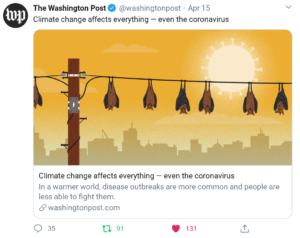Climate change affects everything — even the coronavirus https://t.co/zamNVKZ2mF
— The Washington Post (@washingtonpost) April 15, 2020
By Sarah Kaplan – Washington Post science reporter
Excerpt:
Is the coronavirus pandemic connected to climate change?
— Tom, France
The short — and incomplete — answer to this question is: not really.
Although climate change is expected to worsen many kinds of disease, especially tropical illnesses carried by insects, coronaviruses like the current one are not on the list. Scientific evidence suggests that SARS-CoV-2, the germ that causes covid-19, is closely related to a virus found in bats. Humans may have contracted it through an intermediate host, a scaly anteater called a pangolin that is traded at illegal wildlife markets.
The virus doesn’t appear to care what the average global temperature is; indeed, a National Academies of Sciences panel last week cautioned that changes in heat and humidity may not affect how covid-19 spreads.
The more accurate answer is: of course. Climate change is frequently described as a threat multiplier, something that exacerbates existing problems and creates new ones. No aspect of life on this planet has been untouched by climate change — viruses included.
The world is rife with viruses; at least 320,000 kinds are known to infect mammals alone. And these pathogens rarely stick within one species.
Most of the pandemics of the past 100 years — indeed, most of the diseases that humans can have — were caused by “zoonoses,” or germs that come from other animals. HIV emerged from nonhuman primates. Ebola is borne by bats. The measles virus evolved from a disease that hurts cows sometime around the third century A.D.
Viruses hijack the cellular machinery of their hosts to make copies of themselves, and many don’t have any proofreading mechanism to edit mistakes out of their genetic material. This means they mutate far faster than cellular life and can adapt to change rapidly.
By altering the environment at a faster rate than any other moment in geologic history, scientists say, humans have created a wealth of chances for viruses to evolve.
#
Related links:
Climate change increases the spread of malaria
Climate Flip-Flop: ‘Global Warming’ Will Now Cause LESS Disease
Climate Change Experts Flip-Flop, Again: Global Warming Will Now Cause Less Disease
Oops. Which is it?
2016 Claim: ‘Warmer climate could lower dengue risk’
2015 Claim: ‘Dengue Outbreaks Increase with Climate Change’
The mountain of failed predictions and significant flip-flops seems to be never-ending when it comes to climate change experts.
For years they predicted (i.e. carelessly speculated) that a warming climate would increase the incidence of the nasty dengue fever disease. (See: Flashback 2011: NYT : ‘In a single article, NYT blames CO2 for allergies, Lyme disease, malaria, dengue fever, extreme weather, asthma, trauma, depression, high blood pressure, & heart disease’)
But now researchers are reporting that the incidence of the disease (and Zika as well) could actually be reduced with warming climate change. (Someone had better tell the AP and Al Gore! See: Associated Press’ Seth Borenstein Links Zika outbreak to global warming – Al Gore Aproves & NYT: ‘Global Warming’ Could Be Causing Malformed Babies In Brazil)
“While climate change generally poses a major threat to humanity, it also may reduce the incidence of dengue in some areas,” said Dr Harley, an epidemiology researcher at the ANU Research School of Population Health. … The findings are also relevant to other mosquito-borne viruses including Zika because the mosquitoes that carry dengue also transmit the Zika virus. … “There is significant concern in countries on the margin of the tropical areas where dengue is mainly found, that with global warming dengue and other mosquito-borne viruses such as Zika will encroach and become common,” Dr Harley said. … “Previous projections have suggested that climate change will increase transmission of mosquito-borne diseases globally. … “Our work, using a mathematical model based on Queensland conditions, suggests that dengue transmission might decrease with greater warming.”
Naturally, this is good news that all global warming alarmists should embrace, with the exception of a single caveat regarding the study that should give pause. This latest flip-flop was based on a computer model, which is quite simply, nothing but simulated research using limited empirical evidence. Previous failed-prediction and peer-reviewed articles.
#
Or it it?
Climate change decreases the spread of malaria
More examples of opposite predictions:
Flashback 2007: ‘Global warming’ will ‘reduce the length of a day’ – ‘Make Earth spin faster’

But wait, which is out?! Is there any way to falsify ‘global warming’?

(More: via the Corbett Report)
Climate change makes for shorter winters
Climate change makes for harsher winters
Climate change means less snow

Climate change means more snow
Climate change causes droughts in California
Climate change causes floods in Texas and Oklahoma
Climate change makes wet places wetter and dry places drier…

…except when it makes wet places dryer…

…and dry places wetter

Climate change causes more hurricanes
Climate change causes less hurricanes
Climate change causes more rain (but less water)
Climate change causes less rain
Climate change decreases the spread of malaria
Climate change increases the spread of malaria
Climate change makes San Francisco foggier
Climate change makes San Francisco less foggy
Climate change causes duller autumn leaves
Climate changes causes more colourful autumn leaves
Climate change makes for less salty seas
Climate change makes for saltier seas
Climate change causes Antarctica to lose land ice

Climate change causes Antarctica to gain land ice
Climate change makes the earth hotter…

…unless the earth isn’t getting hotter…

…in which case climate change can explain that, too.










